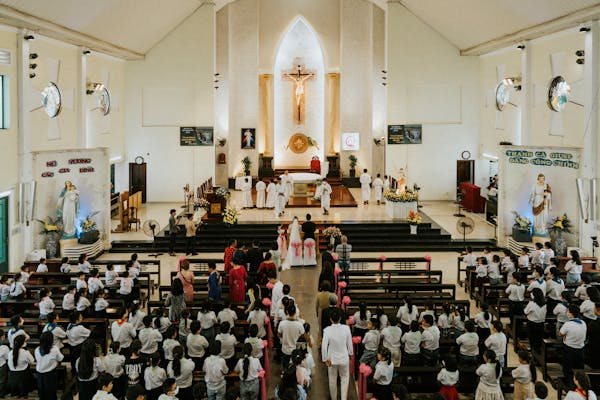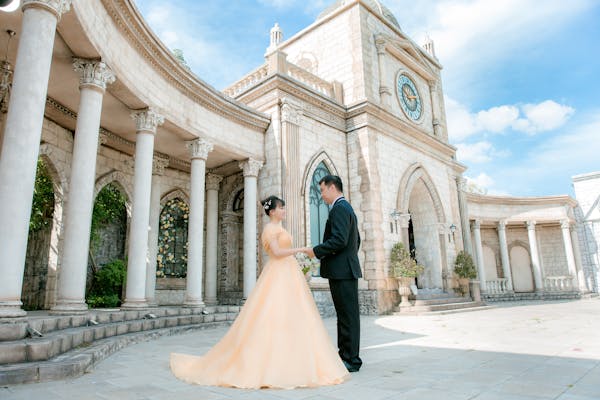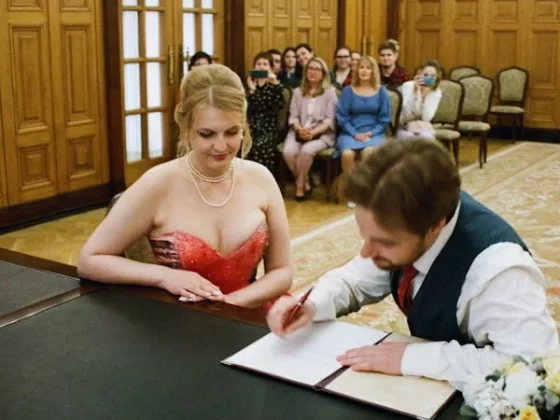
Discovering a life partner is a true blessing. There are essential steps if you’re recently engaged and considering a Catholic Church wedding. In Catholic tradition, marriage is a sacred sacrament, and these steps pave the way for a lifetime of love and commitment to each other and God. Uncover the Catholic Church Wedding Guide’s six essential steps for an easy wedding flow.
Catholic Church Wedding Guide:
Ensure Compliance with Vital Church Requirements
Adhere to the criteria set forth by the Church:
-
Baptized Christians
By Catholic marriage guidelines, at least one partner is required to be a baptized Catholic. However, if one of the partners is not Catholic, they should still be a baptized Christian. This inclusivity ensures that both partners share a foundational faith commitment. Furthermore, suppose the non-Catholic partner desires to join the Catholic Church. In that case, they are encouraged to do so and can embark on becoming a Catholic as an adult during the marriage preparation period. This process strengthens the spiritual bond between the couple and fosters a deeper connection to the Catholic faith community.
-
Must not be closely related
Catholic doctrine does not permit marriage within immediate family circles, including first cousins. This restriction is in place to uphold the integrity of familial relationships and prevent potential conflicts from such unions. By respecting these boundaries, Catholics affirm the importance of maintaining healthy familial connections while adhering to the Church’s teachings on marriage. This prohibition extends beyond first cousins to encompass all individuals considered immediate family members, ensuring that marriages are founded on principles of love, respect, and appropriate familial boundaries.
-
Must be Free from Marriage
By Catholic matrimonial regulations, both individuals intending to marry must be free from any prior marital bonds. This entails being unmarried when seeking marriage within the Catholic Church. However, should either prospective spouse have been previously married, certain conditions must be met to ensure the validity and sacramental integrity of the impending union.
Firstly, if a prior marriage ended due to the death of a spouse, the surviving individual is considered free to marry within the Catholic Church. This acknowledgment of the natural conclusion of the marital bond through death allows for a new union.
Alternatively, if a previous marriage was dissolved through annulment, the Catholic Church must recognize that the previous union was not sacramentally valid. An annulment declares that a marriage lacks one or more essential elements for a valid sacrament. Thus, upon receiving an annulment from the Catholic Church, an individual is deemed free to enter into a new marriage within the faith.
The requirement for both parties to be accessible to marry underscores the Church’s commitment to the sacredness and permanence of the marital bond. It ensures that each union is entered into with due reverence and respect for the sacramental nature of marriage. By adhering to these guidelines, couples affirm their commitment to building a union recognized and blessed within the Catholic faith tradition, laying a solid foundation for their future together.
-
Must be of Opposite Sex
The Catholic Church teaches that marriage, a sacred covenant between a man and a woman, originates from God’s divine plan, as seen in the biblical creation of Adam and Eve. This belief reflects deeper theological convictions about human relationships and marriage’s purpose. In Catholic doctrine, marriage’s intrinsic nature involves the complementary roles of men and women, aligning with God’s design for human flourishing and family propagation.
Additionally, the Church’s stance on marriage is grounded in its broader theological understanding of human sexuality and the sanctity of life. Marriage is viewed not simply as a social or legal contract but as a sacrament—an embodiment of God’s grace. This sacred union symbolizes the selfless love between Christ and his Church.
By maintaining marriage’s definition as between a man and a woman, the Catholic Church underscores its commitment to upholding the dignity of marriage and family within God’s plan. This teaching is a guiding light for Catholics navigating their faith, emphasizing the enduring significance of the marital bond within Christian life and community.
-
Must be in Good Standing by the Church
Being recognized as a Catholic in good standing by the Church encompasses more than a six-month attendance record at Mass leading up to the wedding. While consistent Mass attendance over a specified period, which can vary among dioceses, is indeed a component, the deeper essence of this status pertains to one’s spiritual condition and relationship with the Church.
To be in a state of grace, as required for Catholics in good standing, signifies a spiritual purity and readiness to participate fully in the Church’s sacramental life. This entails being free from mortal sin and actively seeking reconciliation through the sacrament of Confession when necessary. It is about nurturing a vibrant spiritual life characterized by prayer, reflection, and adherence to the teachings of the Church.
Furthermore, being in good standing with the Church involves a genuine commitment to living out the Catholic faith in all aspects of life, not just within the confines of the church building. It encompasses embracing the Church’s moral teachings and striving to integrate them into daily actions and decisions. This includes acts of charity, justice, mercy towards others, and a willingness to engage in ongoing spiritual formation and growth.
The term “Catholic in good standing” reflects a holistic approach to faith, where outward observance of rituals and practices is coupled with an inward transformation of the heart and mind. It is about embodying the values and principles of Catholicism in both word and deed and actively participating in the life of the Church as a faithful disciple of Christ.
-
Must Freely Consent
In Catholic marriage, free consent is essential, meaning both individuals willingly enter the union without coercion. It’s more than avoiding external pressure; it requires emotional and psychological readiness. Valid marriage entails mutual understanding and communication, resolving any issues beforehand. It also involves internal harmony, without doubts or conflicts undermining commitment. Couples are encouraged to reflect deeply on their readiness and seek pre-marital counselling and spiritual guidance. This emphasis on free consent upholds the integrity of marriage, ensuring informed decisions and fostering healthy relationships within the faith community.

Get in touch with your local parish.
Contact your parish after ensuring you meet the requirements to initiate discussions about your upcoming wedding. Seek permission to marry within the Church at your current parish or another location. Additionally, consult with the diocese or intended parish to confirm registration requirements.
Upon contacting your parish, expect an initial meeting with clergy to discuss your marriage plans. Use this opportunity to address any questions or concerns about Catholic marriage requirements. During this consultation, the clergy will guide you through arranging a Catholic wedding, clarifying the responsibilities and steps involved.
This meeting also encourages open dialogue about your relationship and future aspirations. Through this collaborative process with clergy, you can confidently embark on your marriage journey, laying the foundation for a union grounded in faith and love.
Engage in a marriage preparation program.
Every parish implements a structured marriage preparation program, a fundamental requirement for couples intending to marry within the Catholic Church. Typically, most dioceses mandate at least six months’ participation in marriage preparation, encompassing various educational components such as classes, mentoring sessions, or seminars.
Known colloquially as “Pre-Cana,” this preparatory process is essential for providing couples with a comprehensive understanding of the significance that the Church attributes to marriage and an overview of its teachings on family life.
Throughout the marriage preparation program, couples are immersed in various topics to equip them with the necessary skills and insights for a successful marital journey. These topics often include discussions on balancing values, effective financial management within a marriage, the integral role of family dynamics, fostering healthy sexuality and intimacy, family planning and parenting strategies, honing communication skills, and delving into the theological underpinnings of marriage as understood within the Catholic tradition.
While participation in marriage preparation classes at the parish level is the norm, couples with scheduling constraints may opt for alternative arrangements, such as online courses approved by the Church. These courses offer flexibility and convenience while fulfilling the requisite requirements for marriage preparation, ensuring that couples receive the necessary guidance and instruction tailored to their circumstances.
By actively engaging in a marriage preparation program, couples gain practical insights into the intricacies of married life and deepen their understanding of the sacred commitment they are about to undertake. Through education, reflection, and dialogue, couples are empowered to embark on their marital journey confidently, equipped with the tools and knowledge necessary to navigate the joys and challenges of married life within the framework of their faith.
Submit your certificates to the Church.
Before obtaining permission to marry within the Catholic Church, you’ll need to gather several essential documents, including:
- Recent copies of your baptismal certificates
- Certification of Holy Communion and Confirmation (Note: Sometimes this information is included in the Baptismal registry or inscribed in the back of the recent copy of the Baptismal Certificate. Hence, the Church typically requires a recent copy, dated within six months of the wedding.)
- Affidavit of Freedom to Marry
- Civil marriage license
- Marriage Preparation Course Completion Certificate
As you prepare for your wedding, ensure you collect and keep these documents organized together. This way, you’ll be ready to present them promptly to your priest or Family Life Director when needed.
Arrange the Wedding Mass
Depending on your circumstances, you will have various options to commemorate the Rite of Marriage.
In addition, you’ll also have the opportunity to personalize certain aspects of your wedding ceremony, including the selection of readings and rituals, as well as choosing loved ones to participate in the Mass. Your priest or Family Life Director will provide guidance and support in making these decisions while outlining the decorating guidelines for your chosen parish.
While some aspects of the wedding Mass remain unchanged, they are essential to the Catholic Church’s sacramental tradition. These unalterable aspects underscore the sacredness and solemnity of celebrating your marriage within the Church.

Conclusion:
Exchange Vows and Enter into Marriage!
While there are numerous additional details to consider when planning a Catholic wedding, this foundational framework will set you on the right path. Weddings are joyous celebrations of the union between two individuals, blessed by God and witnessed by their loved ones.
As you navigate the process of getting married within the Catholic Church, may it serve as a time of profound spiritual and personal development for you and your beloved.












